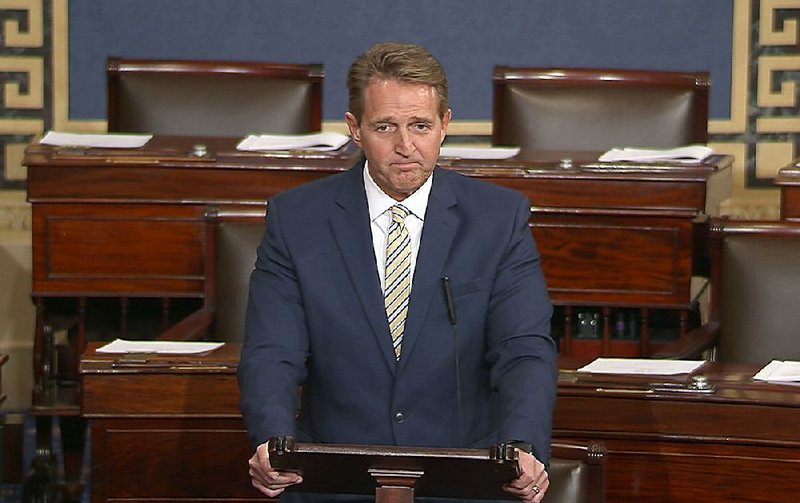WASHINGTON -- President Donald Trump is emboldening authoritarian leaders around the world by dismissing media coverage of his administration as "fake news," Arizona Republican Jeff Flake said in a Senate floor speech Wednesday.
"It is past time to stop excusing or ignoring or worse, endorsing these attacks on the truth," Flake said. The president's tweet in February that news outlets are "the enemy of the American people" uses words "infamously spoken by Joseph Stalin to describe his enemies," said the senator, who has been a vocal critic of the president in recent months.
"Not only has the past year seen an American president borrow despotic language to refer to the free press, but it seems he has now, in turn, inspired dictators and authoritarians with his own language," Flake said. He pointed to complaints about supposed fake news by Philippine President Rodrigo Duterte, Venezuela President Nicolas Maduro and others.
"We are not in a fake news era as Bashar al-Assad says," Flake said, referring to the president of Syria. "We are, rather, in an era in which the authoritarian impulse is reasserting itself to challenge free people and free societies everywhere."
[PRESIDENT TRUMP: Timeline, appointments, executive orders + guide to actions in first 200 days]
Recalling Trump's first year in office, Flake said "2017 was a year which saw the truth -- objective, empirical, evidence-based truth -- more battered and abused than at any time in the history of our country, at the hands of the most powerful figure in our government."
Flake's comments were buttressed by his fellow Arizona Republican, Sen. John McCain, who warned in an opinion piece in The Washington Post that Trump's efforts to undermine the press are "being closely watched by foreign leaders who are already using his words as cover as they silence and shutter one of the key pillars of democracy."
Across the political aisle, Democratic Sens. Amy Klobuchar of Minnesota and Dick Durbin of Illinois also spoke out Wednesday against Trump's rhetoric, echoing Flake's accusation that Trump is trying to upend the distinction between objective truth and lying.
Late Wednesday, Trump tweeted the recipients of what he called "Fake News Awards." In a Jan. 7 Twitter message, Trump said he planned to give out awards Wednesday to media outlets that he claims are "the most corrupt & biased."
Trump tweeted a link to the winners list, which was hosted on GOP.com. The web page promptly went offline.
The "award" recipients included a mix of reporters for The New York Times, ABC News and The Washington Post, as well as reports published by CNN, Time, Newsweek and The New York Times. The winners list also included one topic: "Russia Collusion," which the list called "perhaps the greatest hoax perpetrated on the American people."
Under the winners was a list of 10 of Trump's accomplishments, among them the passage of the GOP tax cuts and the appointment of Neil Gorsuch to the Supreme Court.
Flake on Wednesday chided Trump for conceptualizing the awards.
"It beggars belief that an American president would engage in such a spectacle, but here we are," said Flake, who isn't seeking re-election this year. He urged members of Congress to push back, saying, "If we compromise the truth for the sake of our politics, we are lost."
Republican National Committee Chairman Ronna McDaniel responded to Flake on Twitter, writing, "Sen. Flake, turn on the news. It's wall-to-wall with biased coverage against @POTUS. He has every right to push back. Comparing the leader of the free world to murderous dictators is absurd. You've gone too far."
The president has used the term "fake news" on his Twitter feed at least 167 times, according to a search in an online archive -- most often to disparage reporting about him or his administration. The attacks on the media have been an effective political tool since his election campaign, rallying supporters and insulating him, to some extent, from unflattering reporting.
"Fake news" initially referred to hoax stories believed to be planted by Russian operatives in an attempt to influence the presidential election. Trump co-opted the term to disparage legitimate reporting.
Information for this article was contributed by Laurie Asseo of Bloomberg News; by Noah Bierman and Alex Wigglesworth of the Los Angeles Times; and by Callum Borchers of The Washington Post.
A Section on 01/18/2018

